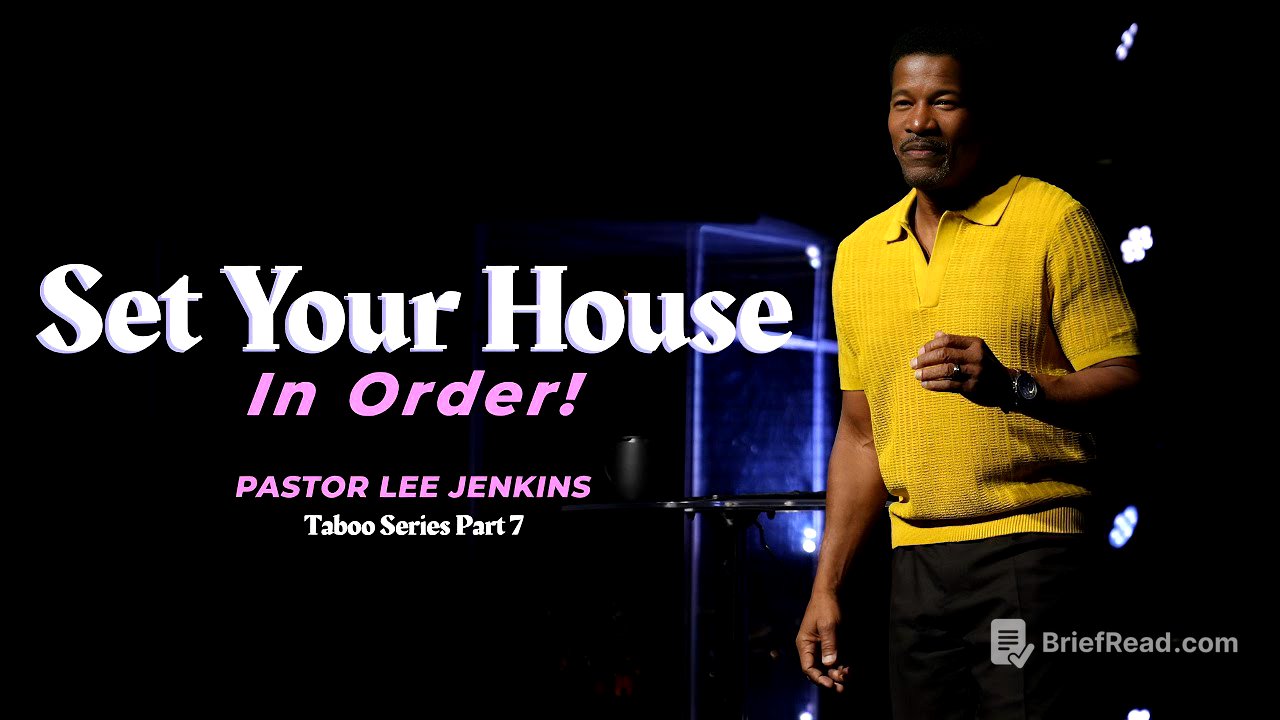TLDR;
This sermon addresses the often-avoided topic of death, urging listeners to prepare spiritually, physically, and financially. It emphasizes facing mortality, providing for loved ones, creating a will, and organizing affairs to ease the burden on those left behind. The message encourages proactive planning and stewardship, framing death not as an end but as a transition to eternal life for believers.
- Facing mortality and having open conversations about death.
- Ensuring financial security for loved ones through life insurance and estate planning.
- Creating a will to clearly outline wishes and avoid legal complications.
- Organizing important documents and information to prevent stress and confusion for family members.
Introduction [0:00]
The sermon begins by introducing the final installment of a series called "Taboo," which addresses subjects often avoided in church settings. Previous topics included the power of Jesus's name, mental health, sexuality, privilege, and giving. This final sermon focuses on death, a universal experience that many are uncomfortable discussing. The aim is to equip listeners to live more fully for Jesus by preparing for the inevitable.
Foundational Scripture: Isaiah 38:1 [3:26]
The foundational scripture for the sermon is Isaiah 38:1, where the prophet Isaiah tells King Hezekiah to "set your house in order, for you shall die and not live." This message, also found in 2 Kings 20:1, underscores the importance of being prepared spiritually and practically for the end of life. Although God later extended Hezekiah's life after he prayed, the initial command highlights the need for readiness.
The Reality of Death [8:22]
The sermon addresses the reluctance to discuss death, noting that it is often feared more than public speaking or snakes. Death makes people uncomfortable because of the uncertainty surrounding when and how it will occur. Despite this discomfort, death is inevitable, and the Bible does not shy away from the topic. Dr. Martin Luther King Jr. described death as "the irreducible common denominator of all men," affecting everyone regardless of status or age. Ecclesiastes 3:1-2 states that there is a time for everything, including birth and death, while James 4:14 likens life to a vapor that appears briefly and then vanishes.
Physical vs. Spiritual Death [14:49]
The sermon explains the biblical concept of death as separation, distinguishing between physical and spiritual death. Physical death is the separation of the soul and spirit from the body. Spiritual death is the separation of the soul from God, a state all humans are born into due to the sin of Adam. Being "born again" through Jesus reconciles individuals to God, overcoming spiritual death through Jesus's sacrifice and resurrection. If one is born only once (physically), they will die twice (physically and spiritually). If born twice (physically and spiritually), they will die only once (physically).
Facing Mortality: Have the Talk [21:59]
The first step in setting one's house in order is facing the reality of mortality. This involves acknowledging that life on Earth is temporary and having open conversations with loved ones about end-of-life matters. Ignoring death does not make it disappear, nor does it extend life. Christians should view death differently, as the Apostle Paul stated in Philippians 1:21, "For to me, to live is Christ, and to die is gain." This perspective shifts the focus from earthly attachments to the promise of eternal life with Christ.
Providing for Loved Ones: Don't Leave Empty-Handed [28:09]
The second key point is to ensure that loved ones are provided for financially. The average black family passes on zero assets to the next generation, often due to a reluctance to discuss or plan for death. Having adequate life insurance is presented as an act of love, protecting the lifestyle of loved ones after one's passing. Proverbs 13:22 emphasizes that a good person leaves an inheritance for their children's children, impacting at least three generations.
The Importance of a Will [31:21]
Creating a will is the third way to set one's house in order. Seven out of ten Americans die without a will, leading to potential legal complications and family disputes. A will ensures that one's wishes are carried out and provides clarity for loved ones. The speaker shares a personal anecdote about his mother, who planned her funeral and estate in detail, making the process easier for her family. A will is described not just as a piece of paper but as "peace of mind for everyone involved."
Organizing Affairs: Don't Leave a Mess [35:54]
The final step is to organize one's affairs to avoid leaving a mess for loved ones. This includes consolidating important documents, such as bank accounts, passwords, and contracts, in one accessible place. Psalm 90:12 encourages individuals to realize the brevity of life and to use wisdom in managing their affairs. The goal is to minimize stress and confusion for grieving family members by ensuring that everything is in order.
Conclusion and Call to Action [39:13]
In conclusion, the sermon reiterates the importance of setting one's house in order spiritually, physically, and financially. Wives are specifically encouraged to discuss these matters with their husbands, as women often outlive their spouses and may be left unprepared. The assignment for the week is to begin the process of preparing for the inevitable. The sermon ends with a prayer and an invitation for those who have never committed their lives to Christ to do so, emphasizing that accepting Jesus is the key to overcoming spiritual death.









